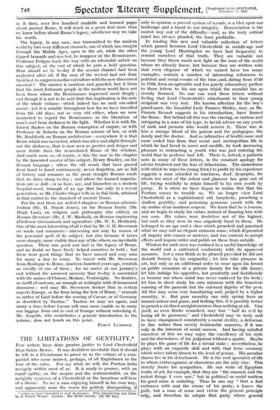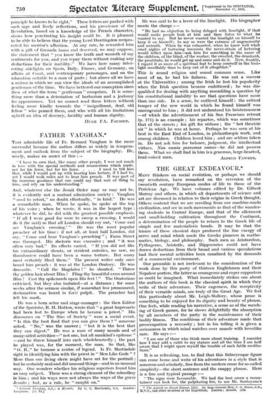THE LIMITATIONS OF GENTILITY.
FEW writers have done greater justice to Lord Chesterfield than Sainte Bettye. It was doubtless inevitable that it should be left to a Frenchman to prove to us the virtues of a com- patriot who came nearest, perhaps, of all Englishmen to the tone of the salon. For say what we will, the Puritan lurks savagely within most of us. It is ready to pounce, with an equal agility, on the sceptic and the sentimentalist, on the sprightly cynicism of a Chesterfield or the luxurious self-love of a Sterne. To see a man enjoying himself in his own way, and .apparently none the worse for politely .disregarding, if * Letters of Lord Cheetrfield to Lord Huntingdmi. With Introduction and .Notes by A,-Francis -Steuart. London: The hided "SocieWr fait; SC-net.]
only in opinion, a proved system of morals, is a blot upon our landscape and a taunt to our integrity. Denunciation is the easiest way out of the difficulty—and, as the truly critical mind has aim ays pleaded, the least profitable.
In reading this new and valuable collection of letters which passed between Lord Chesterfield in middle-age and the young Lord- Huntingdon we have had frequently to remind ourselves of that truth. They are valuable not because they throw much new light on the man of the world whom we already know, but because they are written with that even elegance of which we cannot have too many examples, contain a number of interesting references to political and social events of the time, and, dating from 1740 to 1769, form an agreeable and less purely admonitory preface to those letters to his son upon which the moralist has so sternly frowned. No one can read these letters without feeling that Lord Chesterfield's attachment to their young recipient was very real. His known affection for the boy's grand-aunt, the beautiful Lady Frances Shirley, may, as Mr. Francis Steuart suggests in his introduction, have fanned the flame. But behind all this was the craving, so curious and intriguing in a man of his type, to lavish advice on any youth of rank and promise who would receive it. There was in him a strange blend of the patron and the pedagogue, the dandy and the doctor. And as infirmities of health more and more exiled him from that social and metropolitan life in which he had loved to move and meddle, he took increasing pleasure in instructing a youth who was just entering the world that he perforce had left. There is, indeed, a pathetic note in many of these letters, in the constant apology for advice tendered and the fear of didacticism. The earnestness with which he urges his young frieni to profit by his experience suggests a man schooled to loneliness, deaf, dyspeptic, for whom too most of the colour and glamour has gone out of life, trying wistfully to relate himself to his own youth by proxy. It is when we have begun to realize this that the Puritan ceases to trouble us. We no longer view Lord Chesterfield as a sophisticated old busybody, preaching a shallow gentility, and poisoning generous youth with the sly malice of an insidious serpent. We learn that he is human, and we begin to study his values instead of dunning him with our own. His values were doubtless not of the highest, but such as they were he was singularly loyal to them. He belonged to an age and a class which preached and practised what we may call an elegant common sense, which deprecated all inquiry into causes or motives, and was content to accept effects and impose order and polish on these from outside.
Wisdom for such men was confined to a useful knowledge of the world and a cultivated conformity with its approved manners. Let a man think as he pleaSed provided-he did not disturb Society by his originality ; let him take pleasure in art, but only as an additional order to wear upon his breast on public occasions or a private luxury for his idle hours.; let him indulge his appetites, but prudently and fastidiously as became one whose mind was never enslaved by his body ; let him in short study his own: interests with the tenacious cunning of the parasite but the outward dignity of the peer. All this may seem very humiliating and, judged by a higher morality, is. But pure morality can only spring from an inward ardour and grace, and lacking this, it is possibly better to preach a civilized unrighteousness than nothing at all. Vice itself, as even Burke remarked, may lose "half its evil by losing all its grossness," and Chesterfield may be truly said to have championed consistently a moral civility, a deference to. fine rather than merely fashionable manners, if it was only in the interests of social success. And having satisfied ourselves of this we may enjoy the excellency of his style and the shrewdness of his judgment without a qualm. Maybe he plays the game of life for a trivial stake ; nevertheless, he plays with an exquisite skill and with that terse economy which raises talent almost to the level of genius. His peculiar charm lies in his detachment. He is the cool spectator of life to whom extravagances or obsessions are the only vice. This strictly limits his sympathies. He can write of Egyptian works of art, for example; that they are "the coarsest and the rudest things I ever sail'," but in political Or Social matters his- good sense is unfailing. Thus he can say "that a fool embraces with zeal the errors of his party, a knave the guilt, but a man of sense and virtue The general principle only, and therefore he adopts that party whose general
principle he knows to be right." These letters are packed with such sage and lively reflections, and his prescience of the Revolution, based on a knowledge of the French character, shows how penetrating his insight could be. It is pleasant to be able to believe that the young Lord Huntingdon recipro- cated his mentor's affection. At any rate, he rewarded him with a gift of Grenada hams and deserved, we may suppose, the statement that "you know the truth and warmth of my sentiments for you, and you repay them without making any deductions for their inutility." We have here many inter- esting sidelights on Spain, Italy, France, and Germany, on affairs at Court, and contemporary personages, and on the education suitable to a man of parts ; but above all we have a in irror in which we can view the ideals of an accomplished gentleman of the time. We have bettered our conception since then of what the term " gentleman " comprises. It is some- thing more than a detestation of barbarism and a jealousy for appearances. Yet we cannot read these letters without feeling more kindly towards the "insignificant, deaf, old fellow" who penned them, and who with all his limitations upheld an idea of decency, lucidity and human dignity.
Ifulon I'A. FAUSSET.



























































 Previous page
Previous page